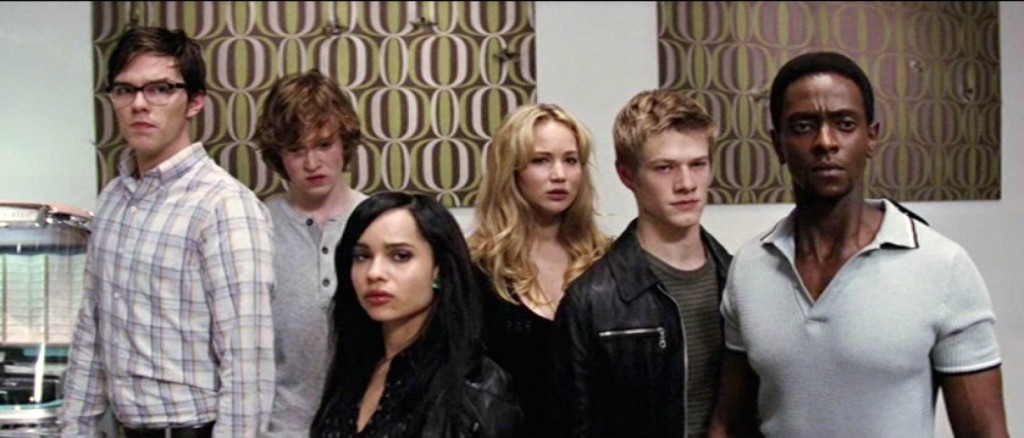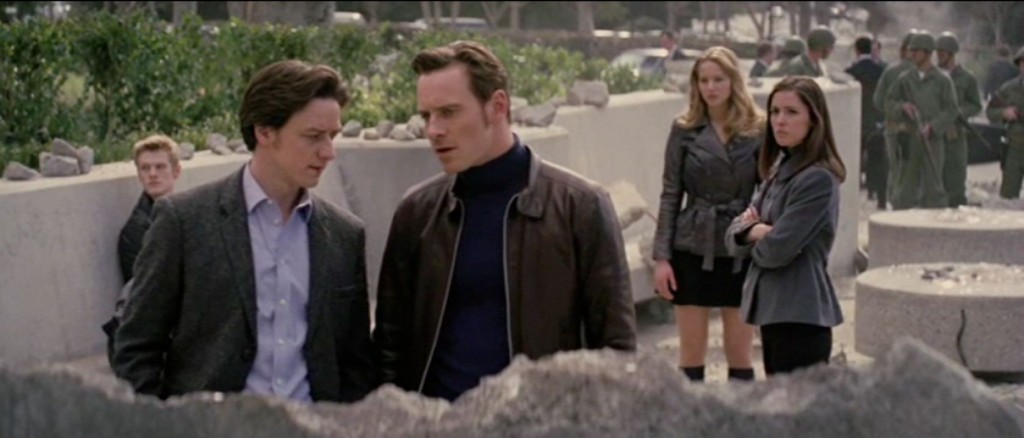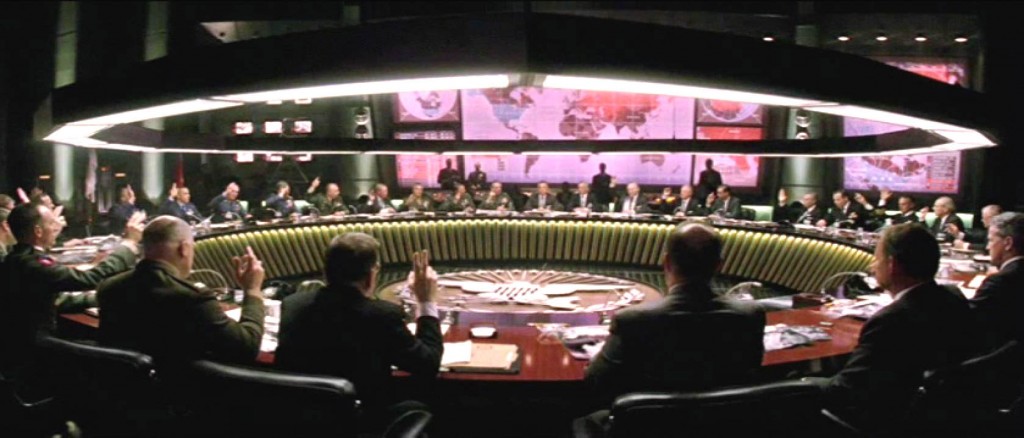X-Men: First Class part 9
While Erik and Xavier, er, “have their way” with Emma in Russia, Shaw and his team make their move on MiB HQ. Shaw is striking back at Xavier for poking around with Cerebro (the shots of Xavier with his head in Cerebro, ecstatic and lit from within, tie him to 60s mind-expansion gurus like Timothy Leary and John C. Lilly). First they kill all the humans, then they come for the mutants. You can come with me and be free, Shaw says, or stay here and live in slavery, and the camera points to Darwin, because, you know, slavery. In the scheme of First Class, this is like the Students for a Democratic Society (which formed in — you guessed — 1962) crashing the peace-and-love party. Shaw, of course, is no student, he’s been around forever, he’s more like an outside agitator, a warmonger disguised as one of the hip kids, fomenting rebellion because, well, that’s the business he’s in. “You can join me and live like kings and queens,” he says, looking at Angel, but we’ve seen how Shaw treats Emma — there will be no equality in Shaw’s version of the future. Angel, she of low self-esteem (she is a stripper, after all) comes with Shaw, but Darwin and Havok try to stop her. Darwin, sadly, goes from being the non-stereotypical black guy to being the stereotypical black-guy-in-the-movies, and becomes the Noble Sacrifice to the cause, the first one to die in the fight against evil.
Shaw then travels to Moscow to persuade the Russian general to put nuclear missiles in Cuba, as an answer scene to the one where he persuaded Col Hendry to put missiles in Turkey. The placement of nuclear missiles in Turkey and Cuba, for those not up on their Cold War history, was a very real concern at the time, and seemed like madness to sane people. For a movie in 2011 to suggest that it was not madmen but power-hungry mutants who arranged for the missiles to be placed thus doesn’t even stretch the truth that much. “We are the children of the atom,” says Shaw at one point, and we all were in 1962 — the Bomb’s awesome power drove everyone — world leaders especially — a particular brand of insane.
Erik and Xavier come back from their own Russian sojurn to find MiB HQ wrecked and Darwin dead. Erik and Xavier, so recently getting along so well, now begin to split apart. Xavier wants the kids to go home, Erik wants to fire them up to avenge Darwin. (That would make Darwin the Agent Coulson of First Class.) Xavier splits the difference in their approaches — he will train the recruits, but do it at home, his home.
Meanwhile, back at CIA HQ, McCone (who was a real guy) and Stryker (who was not) have Emma in custody, in a room, and in a costume, designed to remind the viewer of the most famous scene in Basic Instinct, to tie that dangerous blonde to this one. (Catherine Trammel, the character Sharon Stone played in Instinct, was an inversion of the Hitchcock Blonde, the unapproachable ice queen. Catherine was blonde but also provocative, aggressive and wantonly sexual. Emma is, on the other hand, much closer to the Hitchcock ideal, especially as played by January Jones: remote, chilly and disdainful of desire.) McCone, being a straight arrow, wants to “turn Emma over” (to whom?), while Stryker wants to throw out the law. “There’s a war coming,” he says, and it’s better to give up liberties for security. That, of course, ties Stryker to not only Dick Cheney, but to warmongers like Robert McNamara, who pressed the case for the war in Vietnam when he knew it was unnecessary, wasteful and tragic. By making it Stryker who pushes for totalitarianism instead of McCone, it also places one more X-Men character into world history: the real-life director of the CIA, the screenplay asserts, would never hold a US citizen without due process, it would take a comic-book character to do something that crazy. There’s a war on, “but with whom?” asks McCone, as well he should: the Cold War was as much about going toe-to-toe with the Soviets as it was about America’s war on its own people, its own Other.
In the War Room, the assembled brass, led by the Secretary of State (the screenplay does not identify him as Dean Rusk, so there is no reason to suspect that Dean Rusk ever had to deal with a mutant conspiracy to destroy the world) agrees to blockade Cuba in order to prevent the Soviets from putting missiles there. This, too, more or less lines up with historical fact. That this vote takes place in Dr. Strangelove‘s War Room gives it only the slightest spin into fiction. In a similar room in the Kremlin, the Russian general holds a vote for his own entry into war.
In between the two dark rooms of power, Xavier welcomes his charges, his kids, under sunlight, open spaces and fresh air, to his home. While the Establishment votes to make war, Xavier, from his position as benefactor, extends a hand of generosity. He places his team into training, giving them each the tools they need to develop their skills. For Erik, skill is not the problem, but redirecting his anger is. Erik believes he’s only effective when out of control, but Xavier, a control freak if there ever was one, pushes Erik to build his talent without anger. Xavier is an idealist, after all, because it’s easy for a hugely wealthy young man to be an idealist, but Erik is a pragmatist: he doesn’t want to save the world, he wants only revenge. Xavier is process oriented, Erik is result-oriented. What’s more, Erik rankles at the very notion that he is there to “learn” from Xavier. He might be his lover, but he won’t be his student. Rather the opposite: as far as Erik is concerned, it’s Xavier who has some things to learn about the harshness of the world. He may be an inspiring teacher, but he’s also a condescending pedant, absolutely sure of his rightness. Like Shaw, he wants to help mutants, to give them their freedom and raise them up. And, like Shaw, the underlying presumption is that his way is the only way to be right. Erik, on the other hand, strikes a more libertarian bent. He, too, wants mutants to be free, but he doesn’t want them to follow any rules at all, he wants them to think for themselves and make their own decisions. He goes to Mystique to press his point, making her heart the battleground between him and Xavier.
Meanwhile, Beast and Mystique’s budding relationship flourishes as Beast finally analyzes the blood he took from her a few reels back. Mystique’s blood, it seems, is unique, it will keep her looking like a teenager when she is middle-aged. That’s a kind of grim news for someone whose whole problem is her appearance, but she sits on Hank’s lap to look in his microscope, simultaneously feeding his desire to be taken seriously as a geek, and teasing his Beast nature out of him.
At the end of the long, eventful “training montage,” Xavier challenges Erik to move a gigantic radar dish. I don’t know whose radar dish it is or how they feel about Xavier and his freaks monkeying around with it, but Erik initially fails to move it. Xavier, for the first time, asks permission to read Erik’s mind, a marker of how far they’ve come in their relationship. Xavier, who has used mind-control indiscriminately throughout the movie so far, now grants Erik his mental privacy. A curious inversion, when the romantic partner grants his lover less intimacy. He dredges up a memory of Erik with his mother, a memory of intense love and tenderness, and tells him that his good memories can outweigh his bad ones if he allows them to, and make him more powerful. Love, he’s saying, is stronger than anger, which was, of course, the revolutionary idea of the 1960s. Erik’s tragedy, like Bruce Wayne’s, is his ultimate inabilty to let go of the past. His trauma is his self-identity. But for now, Xavier has shown him the way to enlightenment, and he is visibly moved.
They look as though they are about to kiss when Moira leans out the window and announces that Kennedy has launched what we know today as the Cuban Missile Crisis. Then as now, nuclear war is the ultimate romance-killer.



it would take a comic-book character to do something that crazy
Yeah, this is one of the general perils of having fantasy characters deal with real events. Either your additions are irrelevant, or you risk taking agency away from real people. The truth is that it doesn’t take a superpowered agenda to make people decide to do moronically awful things. (Unless you take “superpower” in the national sense — which, I suppose, is precisely one of the thematic games this movie is playing with, though I didn’t think about it until just now.)
A curious inversion, when the romantic partner grants his lover less intimacy.
Less intimacy, but more respect. It happens sometimes; a person who sleeps around at the drop of a hat might be hesitant to hop into bed with someone they’ve actually fallen in love with. Or heck — that moment might actually be more intimate for Xavier, because it’s a willing share, rather than something he goes in and grabs against the target’s will.
Yeah, the “taking agency away from real people” is a real concern of mine with genre fiction being tied to real events. The flip side can be just as bad, though: idealistic individuals with physics-defying powers who stand idle in the face of war, major disasters, disease, social upheavals, and so on.
E.g. “Why couldn’t Superman stop 9/11? Why doesn’t Reed Richards cure cancer?” Both the “active participants in history and current events” and “separation of fantastic events and reality” approaches can work with good writing, but that usually means limiting how much “gritty realism” can be incorporated into either story approach.
I brought up the scene with the satellite dish before because it’s one if the things that really stuck with me from this movie. One of the hurdles for this movie is that it’s a prequel, and a prequel that retells a story a lot of people already know at that. Sure there’s some different characters thrown into the mix, but I knew the main character arcs and how they would play out going in. So it’s to the film’s great credit that not only does Erik come across as an extremely sympathetic character, but his redemption actually feels like a possibility. What makes this scene so poignant for me is that I wanted to believe that Erik could find a different path, even though I knew he wouldn’t. Even more impressive is another feat the movies pulls of later on that actually made me forget what I already knew about the story for a moment.
Makes me think of Smallville, whose early success owed a lot to making Lex Luthor a sympathetic character, even though you knew he would eventually turn. They played their hand well enough that reportedly Michael Rosenbaum, the guy playing Lex, would open each new script wondering if this would be when he started to go evil — which I think goes some way toward explaining how they made it work, when the Star Wars prequels failed so badly. You knew it would happen; what you didn’t know was when or how or why.
The “when” was more apparent in XMFC, but they solved that problem in what I think of as the Apollo 13 way. I know how that movie ends; I knew before I ever saw it, because it’s a historical film. Doesn’t matter. I watch it for the dozenth time, and I’m still on the edge of my seat during those final minutes. Because even though I know they’ll be safe, the characters don’t know . . . and I’m not in my head, I’m in theirs. I’m empathizing with them and their fear. (This being another way in which the SW prequels failed.)
Mind you, we were talking about Inglourious Basterds before, which achieves great effect by letting you think you know where the story is going, and then totally shocking you. So, y’know, in theory Erik might not have turned . . . .
When I saw XMFC, I’m sure I registered all the points that made the story a microcosm of the baby boomers’ 1960s experience, if only on a subconscious level, but it’s fascinating to see them articulated. If working within the CIA/MiB headquaters was the “campus” experience, the move to Xavier’s mansion could be the equivalent of the “rural hippie commune” experience. It’s a lot fancier than the average commune of the day, of course, as it represents the “first class” of mutants to attend the Xavier School for Gifted Youngsters, as it will later be known (and looks more like a fancy prep school).
Excellent point, although I’m unaware of anyone from a commune venturing forth to save the world from anything.
This goes more with an earlier installment, but: in that scene when Charles and Erik come home to the campus and Raven gives them their Professor X/Magneto names…those kids are high on something, for sure.
They are high on chromosomes.
That, for me at least, is a huge part of what makes a movie work. There are plenty of predictable plots out there and what separates the good from the bad is not just “how and when do the characters get from point a to point b?” but “How do the characters feel about it and do I care?” I was at least 99% certain that “Toy Story 3” was not going to end with all of th main characters being incinerated. But seeing those characters believing that was the case and what they did knowing that was compelling enough to overcome my feeling that everything would turn out all right.
Oh jeez, that incinerator. Knowing what I do about the folks at Pixar, I sat there kind of thinking maybe they were all going to be incinerated. I thought “Well, it’s dark, but I’m sure they’ll pull it off.” Who knows? Maybe they could have found out there’s a toy heaven or something.
To your larger point, yes, the point of drama is not “how does it turn out?” but “how do you feel watching it?” The dramatist is a purveyor of sensation, like a drug pusher or a pimp. The point of Hamlet is not “everyone dies” but “how do you feel watching those people make those decisions?”
These guys edited the movie so that it ended with the toys incinerated to prank their mother: http://www.youtube.com/watch?v=phFISjORzQs
mutant college mirrors post-civil war black colleges founded under the banner “uplift the race” which, according to ralph ellison’s invisible man, isn’t quite what happened there in his day, and instead of self-love and self-determination professed by the likes of marcus garvey and james baldwin, a cultural deference to white liberal benefactors (and their culture) was taught instead, even without the explicit knowledge of those benefactors, to their ultimate benefit. and so, the xavier institute for gifted mutants, dedicated to rescuing the normals, also fits into a history of subservience disguised as education. xavier definitely has a great deal more to learn, but eric is still not fit to teach, and his bits with the radar dish are a demonstration of his work to get over his impotence.
oh, it would’ve been so wonderful to see ororo munroe in the mix, but considering the other movies in the franchise squandered her, maybe it’s hoping too much that singer could do her justice? she’s xavier’s opposite in many ways — egyptian thief turned goddess, eventually joining the team to walk among “normals” while holding to her culture unashamed.